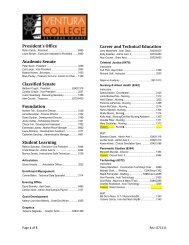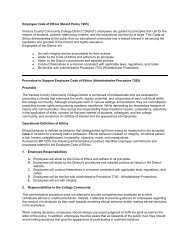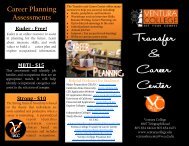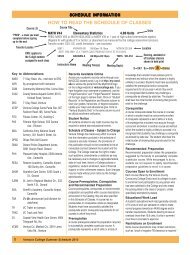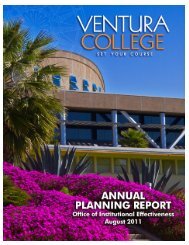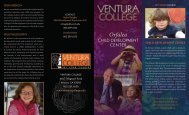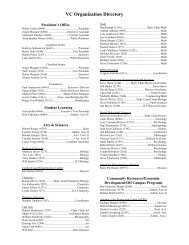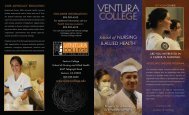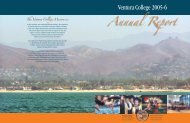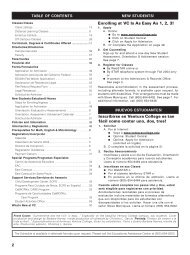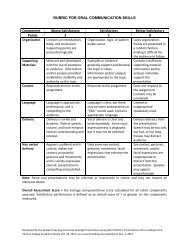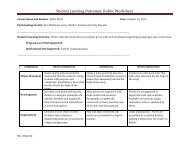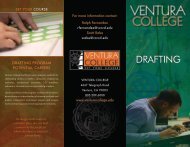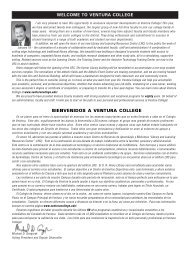2011 General CataloG & announCement of Courses - Ventura College
2011 General CataloG & announCement of Courses - Ventura College
2011 General CataloG & announCement of Courses - Ventura College
You also want an ePaper? Increase the reach of your titles
YUMPU automatically turns print PDFs into web optimized ePapers that Google loves.
Associate Degree Curriculum<br />
The associate degree program in nursing is intended to develop the<br />
necessary knowledge and skills basic to the functions <strong>of</strong> registered<br />
nurses in the direct care <strong>of</strong> clients. Many <strong>of</strong> the courses assigned<br />
to this curriculum are transfer courses and articulation is possible<br />
with the baccalaureate programs in nursing at the California State<br />
University campuses. The courses may be applied as a foundation<br />
for advanced work at the discretion <strong>of</strong> the accepting institution.<br />
<strong>Courses</strong> are taken on campus concurrently with supervised clinical<br />
experience in selected hospitals and agencies, constituting a<br />
nursing science practicum or laboratory experience. Although each<br />
course merits a letter grade, the laboratory experience is based<br />
on pass-fail and it is necessary to pass the laboratory section <strong>of</strong><br />
the course in order to proceed in nursing. Failure in the laboratory<br />
portion <strong>of</strong> nursing courses constitutes an “F” in the course.<br />
For successful completion <strong>of</strong> the program, a minimum grade <strong>of</strong><br />
C is mandatory in all courses required for the nursing major. These<br />
include courses outside the discipline <strong>of</strong> nursing but required for<br />
the major, such as anatomy, microbiology, etc. The student must<br />
maintain an overall GPA <strong>of</strong> 2.0 to continue in the program.<br />
<strong>Courses</strong> are taken on campus concurrent with supervised clinical<br />
laboratory experience in selected hospitals and agencies which<br />
serve as extended campus sites. Each student is responsible for<br />
his/her own transportation to the extended campus sites, some<br />
<strong>of</strong> which are a distance from the <strong>College</strong>.<br />
The nursing program is approved by the California State Board <strong>of</strong><br />
Registered Nursing. To be eligible to take the NCLEX-RN examination<br />
leading to licensure as a registered nurse, the student must have<br />
fulfilled all requirements as defined by the California State Board<br />
<strong>of</strong> Registered Nursing. Students who choose not to complete the<br />
degree requirements are eligible to take the NCLEX-RN licensing<br />
examination after completion <strong>of</strong> content required for licensure.<br />
Please contact the ADN program director for additional information.<br />
30-Unit Option<br />
To be eligible for this option, a student must be a vocational<br />
nurse who is licensed to practice in California. Interested candidates<br />
should contact the nursing counselor for an individual evaluation<br />
<strong>of</strong> eligibility. Individuals who become licensed as registered nurses<br />
using this option may not be eligible for licensure in states other<br />
than California. Students pursuing this option must complete NS<br />
V31 and V41 instead <strong>of</strong> NS V30 and NS V40. All career ladder<br />
programs are on a space available basis. All applicants must meet<br />
GPA and TEAS requirements<br />
Transfer and Advanced Placement<br />
Transfer students may be accepted as space permits. Credit for<br />
nursing courses taken at another institution will be evaluated on an<br />
individual basis. The School <strong>of</strong> Nursing also provides opportunities<br />
for licensed vocational nurses to advance on the career ladder<br />
with vertical mobility providing education leading to eligibility<br />
for registered nurse licensure. To be eligible for this program, a<br />
candidate must be an LVN who is currently licensed in California.<br />
Interested candidates should contact the nursing counselor for<br />
transfer/challenge requirements and applications.<br />
Graduate nurses lacking California licensure requirements may<br />
be admitted into the ADN Program on a space available basis to<br />
complete one or two needed courses as specified by the California<br />
State Board <strong>of</strong> Registered Nursing.<br />
COURSE DESCRIPTIONS<br />
NS V07 - PHARMACOLOGY - 3 Units<br />
Hours: 3 lecture weekly<br />
This course will provide students with a basic understanding <strong>of</strong><br />
the clinical application <strong>of</strong> pharmacology and pharmacotherapeutic<br />
principles across a lifespan. Areas <strong>of</strong> emphasis include drug<br />
classifications, therapeutic uses <strong>of</strong> medications, application <strong>of</strong> the<br />
nursing process, and legal/ethical considerations.<br />
Formerly NS 7. Transfer credit: CSU.<br />
NS V10 - INTRODUCTION TO PROFESSIONAL<br />
NURSING - 10 Units<br />
Prerequisite: admission to ADN program; ANAT V01; MICR V01;<br />
PHSO V01; HEC V24 or PSY V05 or concurrent enrollment; criminal<br />
background clearance ; drug and alcohol clearance ; current CPR<br />
certification for health care provider or pr<strong>of</strong>essional rescuer; pro<strong>of</strong><br />
<strong>of</strong> freedom from and immunity to communicable diseases; physical<br />
examination demonstrating general good health; certification as a<br />
nursing assistant; no visible tattoos or visible body piercings except<br />
single studs in ear lobes; and, no acrylic or long nails in clinical<br />
settings<br />
Recommended preparation: the Board <strong>of</strong> Registered Nursing may<br />
deny licensure to those with criminal records<br />
Hours: 5 lecture, 15 laboratory weekly<br />
This course focuses on Orem’s Self-Care Deficit Theory <strong>of</strong> Nursing<br />
(S-CDTN) which serves as the unifying framework. Throughout the<br />
course, the student will apply principles from the natural, social and<br />
behavioral sciences to the practice <strong>of</strong> pr<strong>of</strong>essional nursing. Students<br />
will have the opportunity to learn S-CDTN as it applies to the nursing<br />
process and issues and trends <strong>of</strong> pr<strong>of</strong>essional nursing. Nursing will<br />
be presented as a component <strong>of</strong> a health care system seeking to<br />
assist the client to improve and/or maintain his/her potential in a<br />
diverse cultural context. This introduction to pr<strong>of</strong>essional nursing<br />
will focus on the use <strong>of</strong> critical thinking skills in health assessment,<br />
identification <strong>of</strong> and intervention for universal self-care requisites,<br />
basic and intermediate skills and pharmacology. Guided clinical<br />
experiences are provided concurrently with theory.<br />
Fees will be required. Field trips will be required. Formerly NS 10.<br />
Transfer credit: CSU.<br />
NS V15 - NURSING SCIENCE REVIEW - 10 Units<br />
Prerequisite: NS V10 with a grade <strong>of</strong> C or better ; criminal<br />
background clearance; drug and alcohol clearance; current CPR<br />
certification for health care provider or pr<strong>of</strong>essional rescuer; pro<strong>of</strong><br />
<strong>of</strong> freedom from and immunity to communicable diseases; physical<br />
examination demonstrating general good health; no visible tattoos<br />
or visible body piercings except single studs in ear lobes; and, no<br />
acrylic or long nails in clinical settings<br />
Recommended preparation: the Board <strong>of</strong> Registered Nursing may<br />
deny licensure to those with criminal records<br />
Hours: 5 lecture, 15 laboratory weekly<br />
This course <strong>of</strong>fers structured remediation in nursing theory and<br />
skills. Emphasis is on progression in utilization <strong>of</strong> principles and<br />
skills that are necessary to develop and implement a plan <strong>of</strong> nursing<br />
care. Orem's Self-Care Deficit Theory <strong>of</strong> Nursing and the nursing<br />
process comprise the unifying framework. Use <strong>of</strong> critical thinking<br />
skills in health assessment, identification <strong>of</strong> and intervention for<br />
universal self-care requisites, basic and intermediate skills, and<br />
pharmacology are stressed.<br />
Fees will be required. Field trips will be required. Formerly NS 15.<br />
Offered on a pass/no pass basis only.<br />
188 Credit <strong>Courses</strong>, Degrees, Certificates, and Awards <strong>Ventura</strong> <strong>College</strong> Catalog 2010 - <strong>2011</strong>



